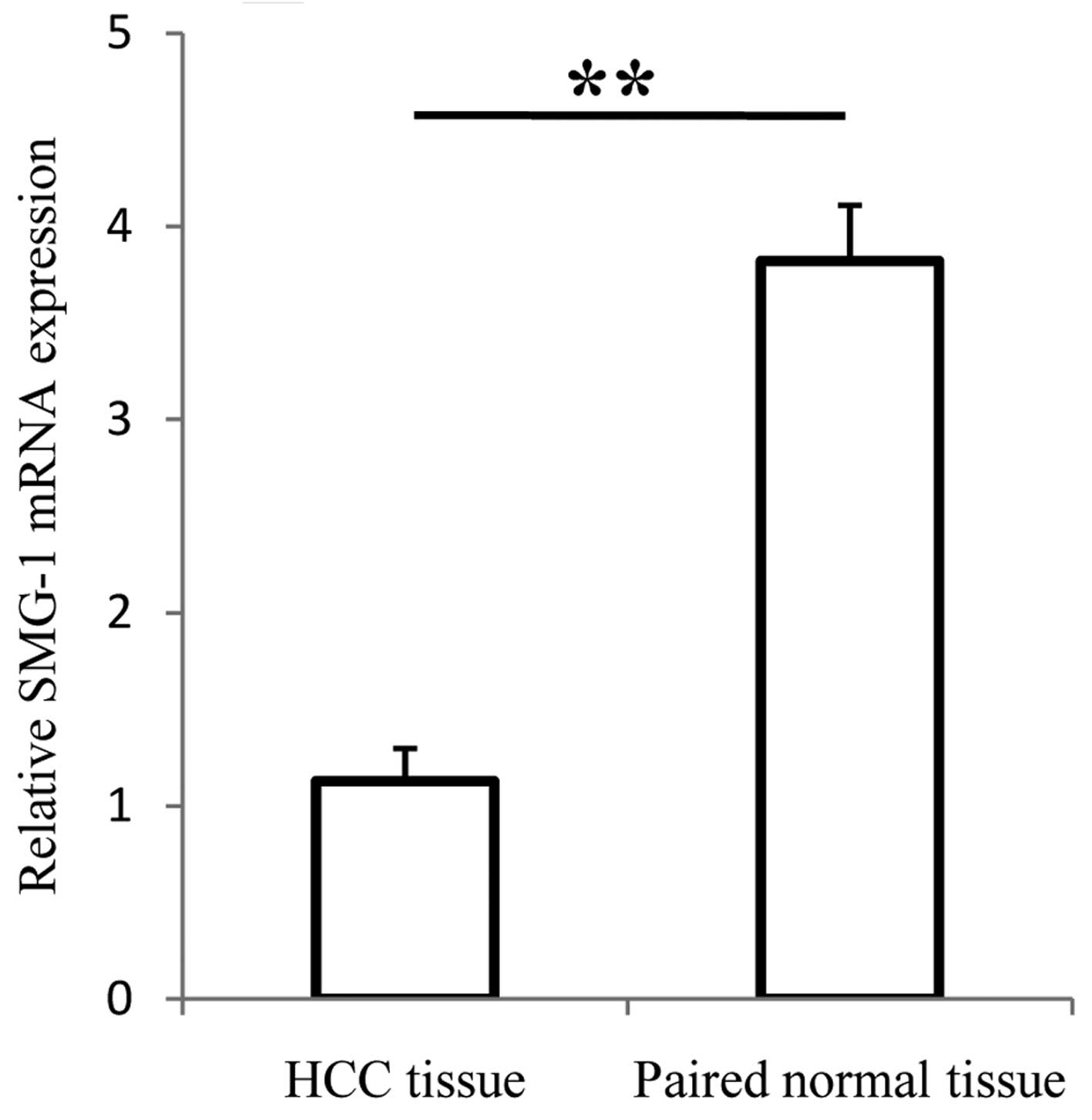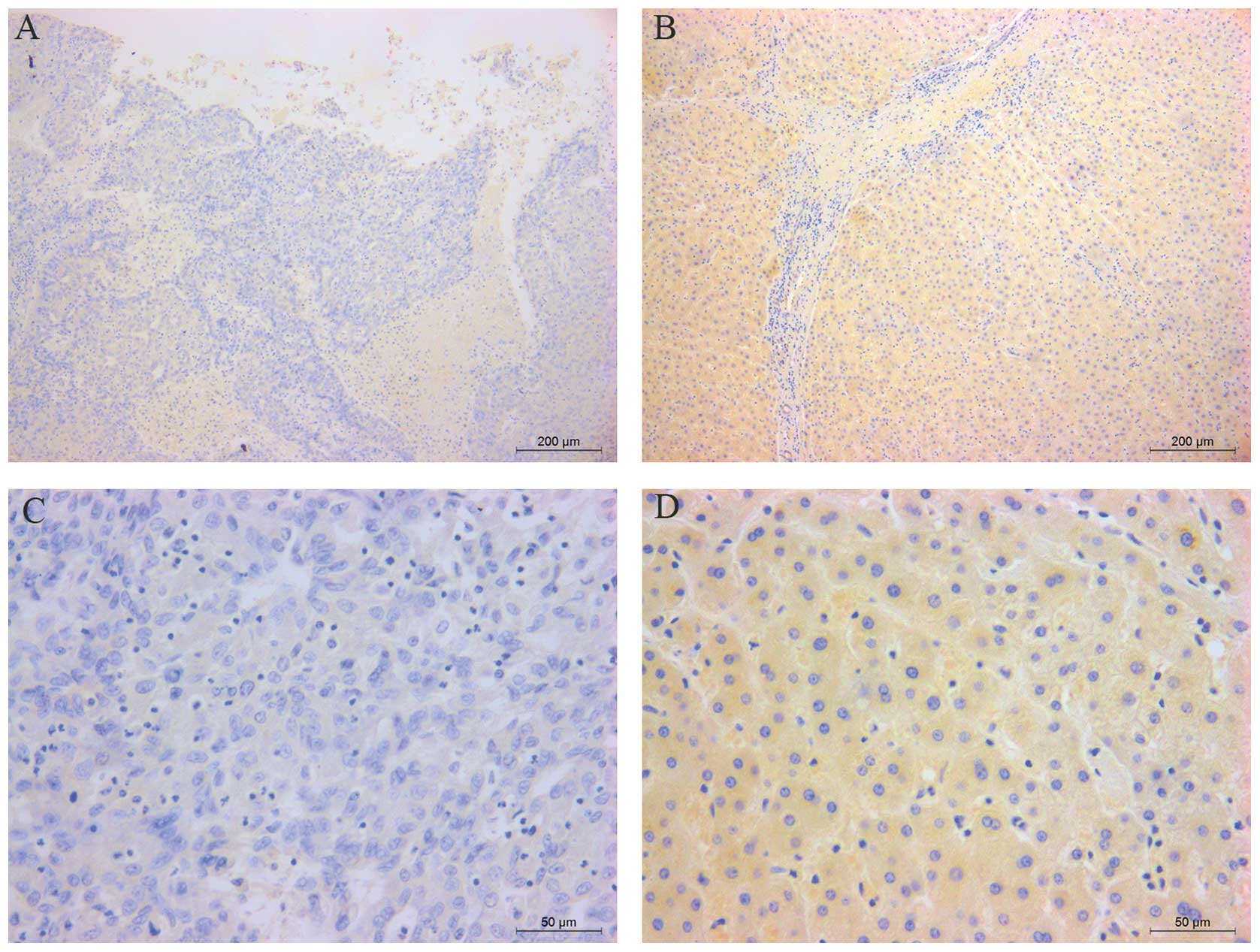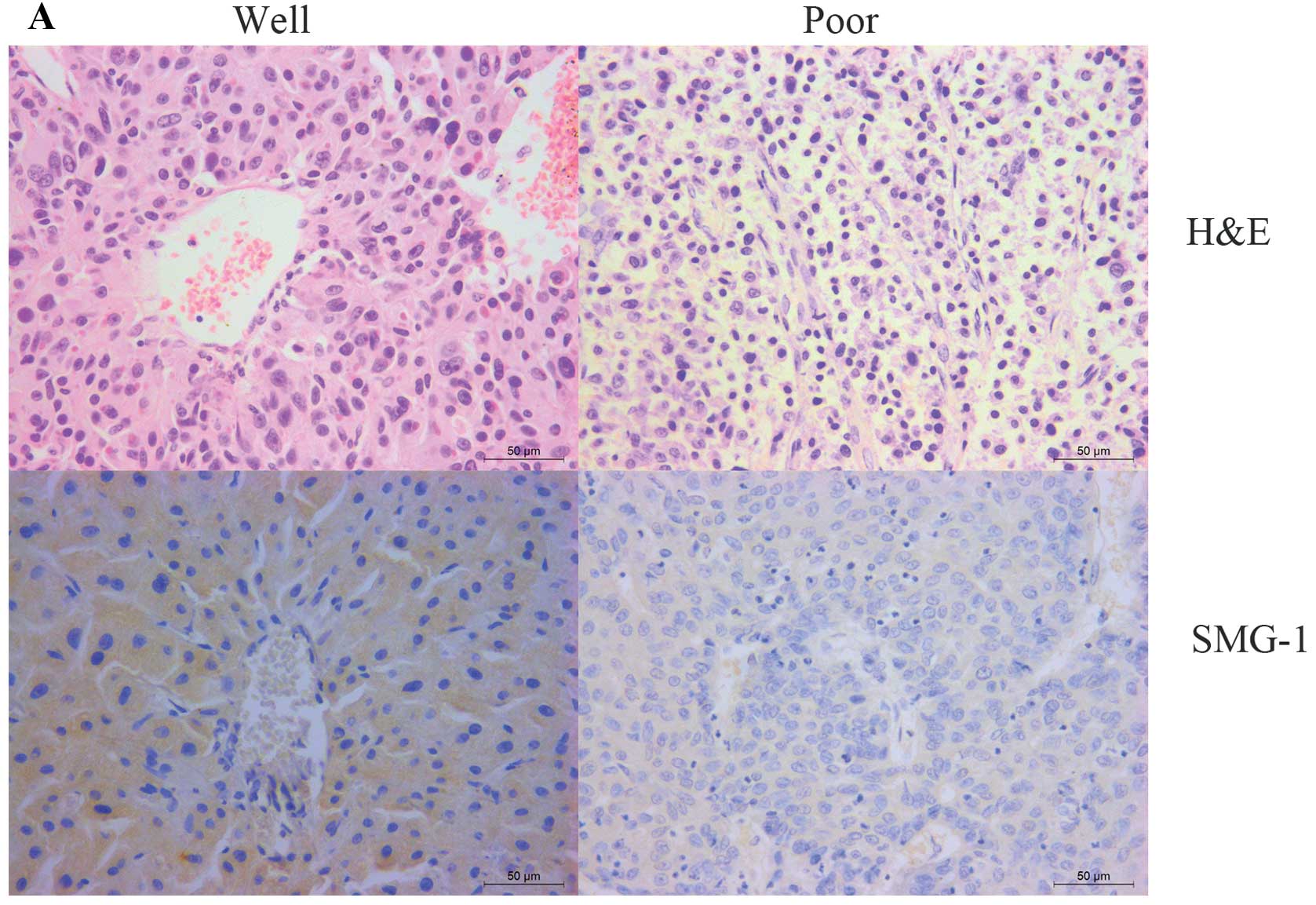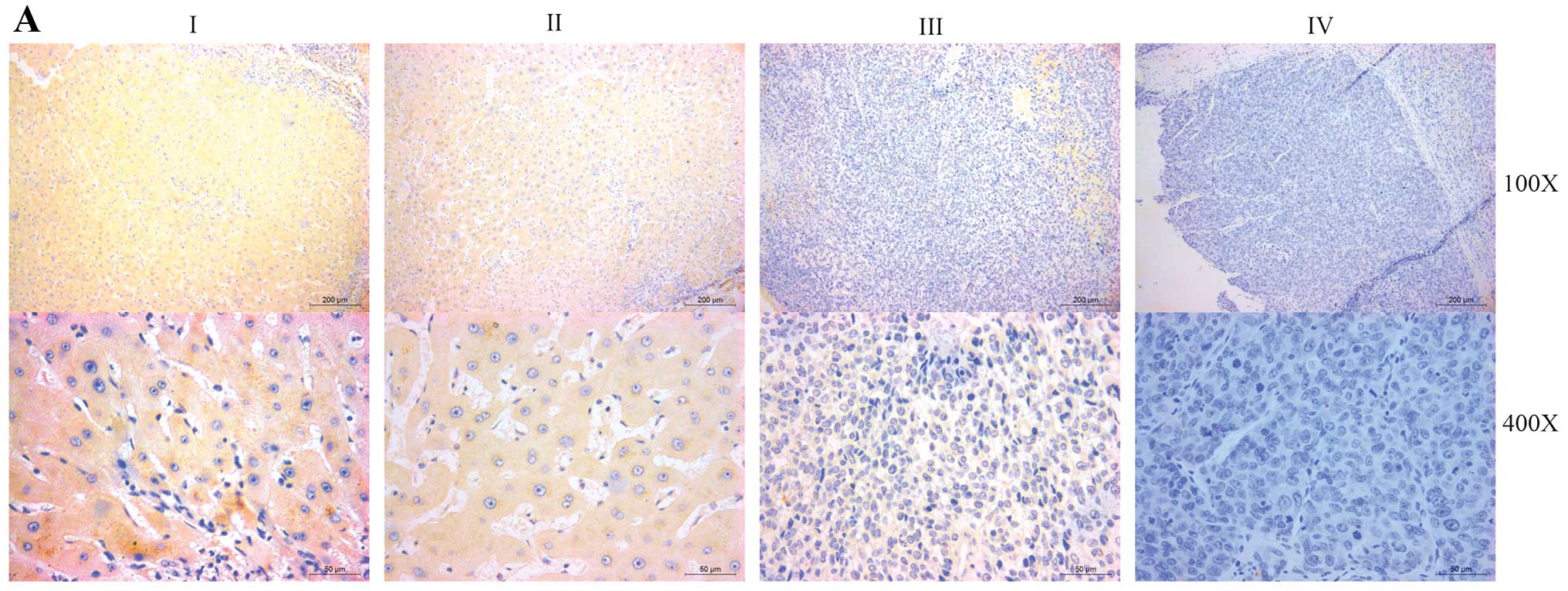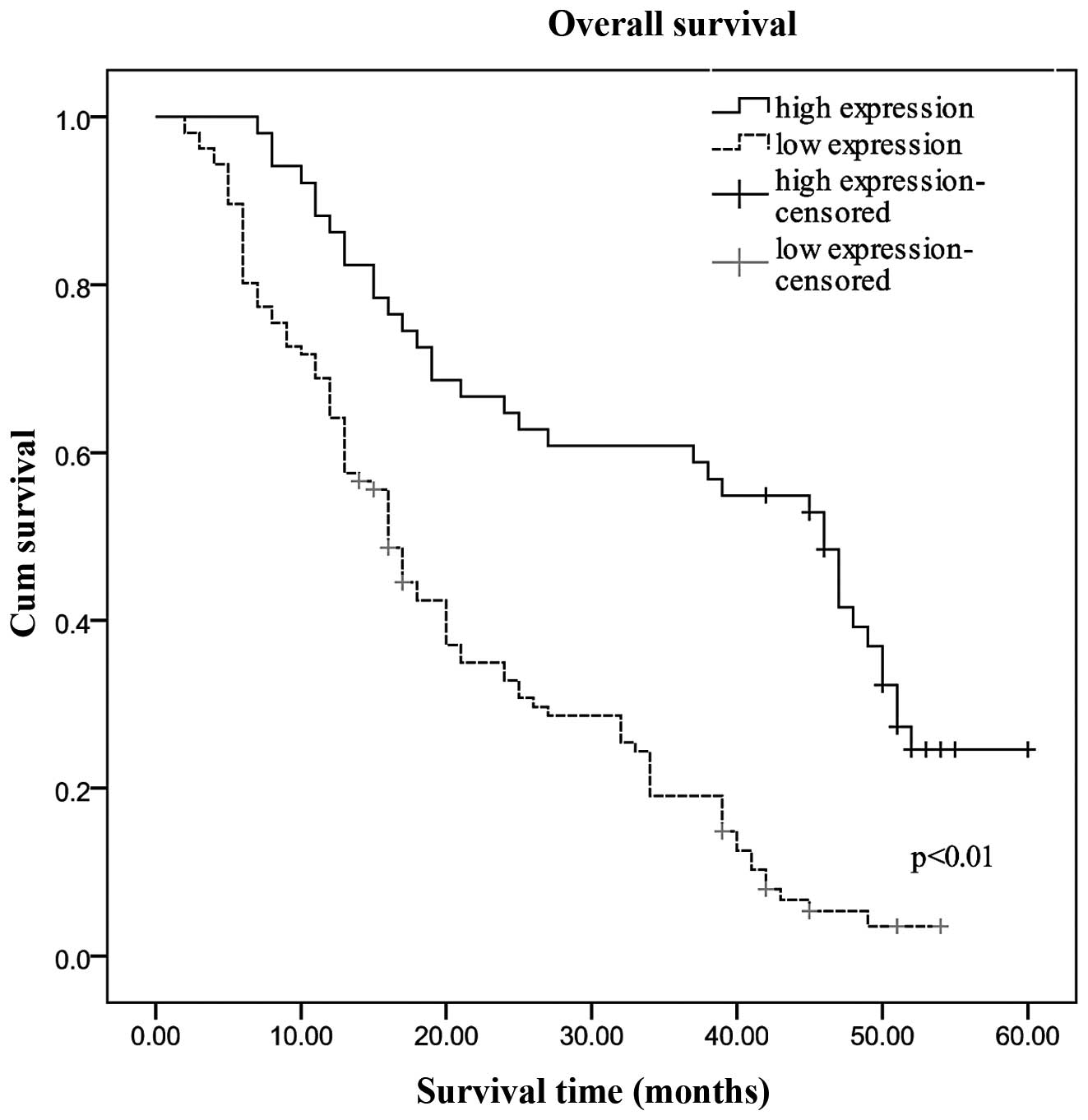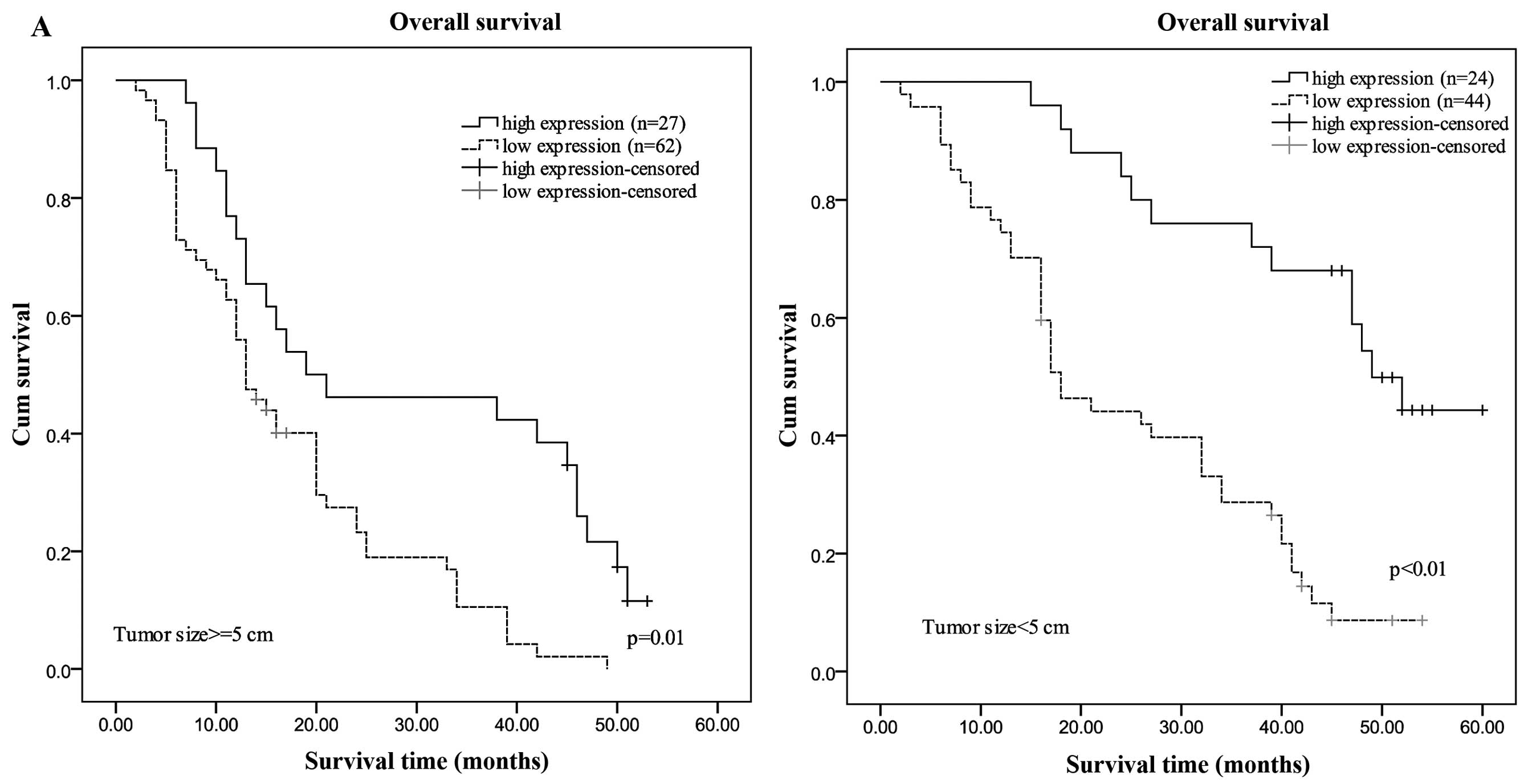|
1
|
Jemal A, Bray F, Center MM, Ferlay J, Ward
E and Forman D: Global cancer statistics. CA Cancer J Clin.
61:69–90. 2011. View Article : Google Scholar
|
|
2
|
He G and Karin M: NF-κB and STAT3 - key
players in liver inflammation and cancer. Cell Res. 21:159–168.
2011.
|
|
3
|
Chen L, Ho DW, Lee NP, Sun S, Lam B, Wong
KF, Yi X, Lau GK, Ng EW, Poon TC, Lai PB, Cai Z, Peng J, Leng X,
Poon RT and Luk JM: Enhanced detection of early hepatocellular
carcinoma by serum SELDI-TOF proteomic signature combined with
alpha-fetoprotein marker. Ann Surg Oncol. 17:2518–2525. 2010.
View Article : Google Scholar : PubMed/NCBI
|
|
4
|
Sidransky D: Emerging molecular markers of
cancer. Nat Rev Cancer. 3:210–219. 2002. View Article : Google Scholar
|
|
5
|
El-Serag HB and Rudolph KL: Hepatocellular
carcinoma: Epidemiology and molecular carcinogenesis.
Gastroenterology. 132:2557–2576. 2007. View Article : Google Scholar : PubMed/NCBI
|
|
6
|
Zhao Y, Wang WJ, Guan S, Li HL, Xu RC, Wu
JB, Liu JS, Li HP, Bai W, Yin ZX, Fan DM, Zhangand ZL and Han GH:
Sorafenib combined with transurethral chemoembolization for the
treatment of advanced hepatocellular carcinoma: a large-scale
multicenter study of 222 patients. Ann Oncol. 7:1786–1792. 2013.
View Article : Google Scholar
|
|
7
|
Denning G, Jamieson L, Maquat L, Thompson
E and Fields A: Cloning of a novel phosphatidylinositol
kinase-related kinase: characterization of the human SMG-1 RNA
surveillance protein. J Biol Chem. 276:22709–22714. 2001.
View Article : Google Scholar : PubMed/NCBI
|
|
8
|
Yamashita A, Ohnishi T, Kashima I, Taya Y
and Ohno S: Human SMG-1, a novel phosphatidylinositol
3-kinase-related protein kinase, associates with components of the
mRNA surveillance complex and is involved in the regulation of
nonsense-mediated mRNA decay. Genes Dev. 15:2215–2228. 2001.
View Article : Google Scholar : PubMed/NCBI
|
|
9
|
Grimson A, O’Connor S, Newman CL and
Anderson P: SMG-1 is phosphatidylinositol kinase-related protein
kinase required for nonsense-mediated mRNA decay in
Caenorhabditis elegans. Mol Cell Biol. 24:7483–7490. 2004.
View Article : Google Scholar : PubMed/NCBI
|
|
10
|
Gehen S, Staversky R, Bambara R, Keng P
and O’Reilly M: SMG-1 and ATM sequentially and independently
regulate the G1 checkpoint during oxidative stress. Oncogene.
27:4065–4074. 2008. View Article : Google Scholar : PubMed/NCBI
|
|
11
|
Cheung H, St Jean M, Beug S, Lejmi-Mrad R,
LaCasse E, Baird S, Stojdl D, Screaton R and Korneluk R: SMG1 and
NIK regulate apoptosis induced by Smac mimetic compounds. Cell
Death Dis. 2:e1462011. View Article : Google Scholar : PubMed/NCBI
|
|
12
|
Brumbaugh K, Otterness D, Geisen C,
Oliveira V, Brognard J, Li X, Lejeune F, Tibbetts R, Maquat L and
Abraham R: The mRNA surveillance protein hSMG-1 functions in
genotoxic stress response pathways in mammalian cells. Mol Cell.
14:585–598. 2004. View Article : Google Scholar : PubMed/NCBI
|
|
13
|
Chen R, Yang Q, Chen Y, Oliveira V, Dalton
W, Fearns C and Lee J: Kinome siRNA screen identifies SMG-1 as a
negative regulator of hypoxia-inducible factor-1α in hypoxia. J
Biol Chem. 284:16752–16758. 2009.PubMed/NCBI
|
|
14
|
Masse I, Molin L, Mouchiroud L, Vanhems P,
Palladino F, Billaud M and Solari F: A novel role for the SMG-1
kinase in lifespan and oxidative stress resistance in
Caenorhabditis elegans. PLoS One. 3:e33542008. View Article : Google Scholar : PubMed/NCBI
|
|
15
|
González-Estévez C, Felix DA, Smith MD,
Paps J, Morley SJ, James V, Sharp TV and Aboobaker AA: SMG-1 and
mTORC1 act antagonistically to regulate response to injury and
growth in planarians. PLoS Genet. 3:e10026192012.PubMed/NCBI
|
|
16
|
Gubanova E, Issaeva N, Gokturk C,
Djureinovic T and Helleday T: SMG-1 suppresses CDK2 and tumor
growth by regulating both the p53 and Cdc25A signaling pathways.
Cell Cycle. 12:3770–3780. 2013. View
Article : Google Scholar : PubMed/NCBI
|
|
17
|
Roberts T, Ho U, Luff J, Lee C, Apte S,
MacDonald K, Raggat L, Pettit A, Morrow C and Waters M: Smg1
haploinsufficiency predisposes to tumor formation and inflammation.
Proc Natl Acad Sci USA. 110:E285–E294. 2013. View Article : Google Scholar : PubMed/NCBI
|
|
18
|
Oliveira V, Romanow WJ, Geisen C,
Otterness DM, Mercurio F, Wang HG, Dalton WS and Abraham RT: A
protective role for the human SMG-1 kinase against tumor necrosis
factor-α-induced apoptosis. J Biol Chem. 283:13174–13184.
2008.PubMed/NCBI
|
|
19
|
Shiloh Y: ATM and related protein kinases:
Safeguarding genome integrity. Nat Rev Cancer. 3:155–168. 2003.
View Article : Google Scholar : PubMed/NCBI
|
|
20
|
Matter MS, Decaens T, Andersen JB and
Thorgeirsson SS: Targeting the mTOR pathway in hepatocellular
carcinoma: current state and future trends. J Hepatol. 60:855–865.
2014. View Article : Google Scholar : PubMed/NCBI
|
|
21
|
Menon S, Yecies JL and Zhang HH: Chronic
activation of mTOR complex 1 is sufficient to cause hepatocellular
carcinoma in mice. Sci Signal. 5:ra242012. View Article : Google Scholar : PubMed/NCBI
|
|
22
|
Bassullu N, Turkmen I, Dayangac M, Yagiz
Korkmaz P, Yasar R, Akyildiz M, Yaprak O, Tokat Y, Yuzer Y and
Bulbul Dogusoy G: The predictive and prognostic significance of
c-erb-B2, EGFR, PTEN, mTOR, PI3K, p27, and ERCC1 expression in
hepatocellular carcinoma. Hepat Mon. 12:e74922012. View Article : Google Scholar : PubMed/NCBI
|
|
23
|
Villanueva A, Chiang DY, Newell P, Peix J,
Thung S, Alsinet C, Tovar V, Roayaie S, Minguez B, Sole M,
Battiston C, Van Laarhoven S, Fiel MI, Di Feo A, Hoshida Y, Yea S,
Toffanin S, Ramos A, Martignetti JA, Mazzaferro V, Bruix J, Waxman
S, Schwartz M, Meyerson M, Friedman SL and Llovet JM: Pivotal role
of mTOR signaling in hepatocellular carcinoma. Gastroenterology.
135:1972–1983. e1–11. 2008. View Article : Google Scholar : PubMed/NCBI
|
|
24
|
Zhou L, Huang Y, Li J and Wang Z: The mTOR
pathway is associated with the poor prognosis of human
hepatocellular carcinoma. Med Oncol. 27:255–261. 2010. View Article : Google Scholar : PubMed/NCBI
|
|
25
|
Buitrago-Molina LE and Vogel A: mTor as a
potential target for the prevention and treatment of hepatocellular
carcinoma. Curr Cancer Drug Targets. 9:1045–1061. 2012.PubMed/NCBI
|
|
26
|
Lee HE, Han N, Kim MA, Lee HS, Yang HK,
Lee BL and Kim WH: DNA damage response-related proteins in gastric
cancer: ATM, Chk2 and p53 expression and their prognostic value.
Pathobiology. 1:25–35. 2014. View Article : Google Scholar : PubMed/NCBI
|
|
27
|
Valkov A, Kilvaer TK, Sorbye SW, Donnem T,
Smeland E, Bremnes RM and Busund LT: The prognostic impact of Akt
isoforms, PI3K and PTEN related to female steroid hormone receptors
in soft tissue sarcomas. J Transl Med. 9:2002011. View Article : Google Scholar : PubMed/NCBI
|
|
28
|
Bhattacharya N, Mukherjee N, Singh RK,
Sinha S, Alam N, Roy A, Roychoudhury S and Panda CK: Frequent
alterations of MCPH1 and ATM are associated with primary breast
carcinoma: clinical and prognostic implications. Ann Surg Oncol.
3:424–432. 2013. View Article : Google Scholar : PubMed/NCBI
|
|
29
|
Shin JU, Lee CH, Lee KT, Lee JK, Lee KH,
Kim KM, Kim KM, Park SM and Rhee JC: Prognostic significance of ATM
and cyclin B1 in pancreatic neuroendocrine tumor. Tumour Biol.
5:1645–1651. 2012. View Article : Google Scholar : PubMed/NCBI
|
|
30
|
Xu W, Li JY, Wu YJ, Yu H, Shen QD, Li L,
Fan L and Qiu HX: Prognostic significance of ATM and TP53 deletions
in Chinese patients with chronic lymphocytic leukemia. Leuk Res.
7:1071–1077. 2008. View Article : Google Scholar : PubMed/NCBI
|
|
31
|
Llovet JM and Bruix J: Novel advancements
in the management of hepatocellular carcinoma in 2008. J Hepatol.
48(Suppl 1): S20–S37. 2008. View Article : Google Scholar : PubMed/NCBI
|
|
32
|
Bruix J, Sherman M, Llovet JM, Beaugrand M
and Lencioni R: Clinical management of hepatocellular carcinoma.
Conclusions of the Barcelona-2000 EASL conference European
Association for the Study of the Liver. J Hepatol. 35:421–430.
2001. View Article : Google Scholar : PubMed/NCBI
|
|
33
|
Tseng PL, Tai MH, Huang CC, Wang CC, Lin
JW, Hung CH, Chen CH, Wang JH, Lu SN, Lee CM, Changchien CS and Hu
TH: Overexpression of VEGF is associated with positive p53
immunostaining in hepatocellular carcinoma (HCC) and adverse
outcome of HCC patients. J Surg Oncol. 5:349–357. 2008. View Article : Google Scholar : PubMed/NCBI
|
|
34
|
Hsu H, Peng S, Lai P, Chu J and Lee P:
Mutations of p53 gene in hepatocellular carcinoma correlate with
tumor progression and patient prognosis: a study of 138 patients
with unifocal HCC. Int J Oncol. 6:1341–1347. 1994.PubMed/NCBI
|















